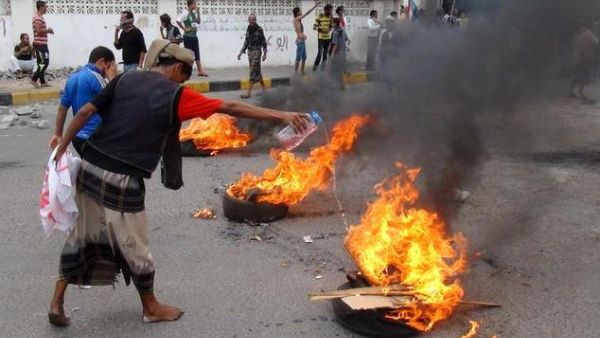Forces loyal to Yemen's former President Abed-Rabbo Mansour Hadi seized government buildings in the southern city of Aden on Monday after a five-hour battle, sources said, escalating a civil conflict that threatens to split the country in two.
Meanwhile, the United Nations Security Council on Sunday urged Yemen's Houthis to cede power, release Hadi and negotiate in "good faith," after the militant group vowed to defy the international body's "threats."
Sources said fighters loyal to Hadi's brother seized Aden's television building, its main power station, the intelligence headquarters and the free zone authority offices in five hours of clashes overnight against forces led by a general seen as allied to the Houthis.
Medics at the city's al-Jumhuriyah Hospital said two people on each side were killed.
The country's north is dominated by the Houthis, who seized power in the capital Sanaa last month, while in the south forces loyal to Hadi and separatists seeking to restore the formerly independent socialist South Yemen appear to be in control.
Aden's governor Abdulaziz bin Habtour, in remarks carried by the Defense Ministry's 26 September news website, confirmed the clashes but denied the television station had been seized by the Hadi loyalists.
Meanwhile, fierce clashes between armed groups resumed in different cities. On Sunday, in the central city of Ibb, which Houthis captured last year, the militants fired on hundreds of protesters to disperse them, wounding several.
Militiamen also clashed with tribesmen east of the central city of Baida, which the Houthis have been trying to overrun as they extend their influence.
Tribal sources said at least 12 Houthis were killed, but there was no independent confirmation of the toll.
On Thursday, UN Secretary-General Ban Ki-moon appealed to the Security Council for action to halt Yemen's slide toward anarchy, warning the country was "collapsing before our eyes."
On Sunday, the Security Council in its resolution demanded that the Houthis "immediately and unconditionally" engage in "good faith" in UN-brokered negotiations, withdraw their forces from government institutions and relinquish power.
The text, adopted unanimously by all 15 council members, also demanded that the militia release Hadi, Prime Minister Khaled Bahah and other officials and activists under de facto house arrest or in detention.
All parties must "accelerate inclusive UN-brokered negotiations" and set a date for a constitutional referendum and elections, the resolution added.
It raised the possibility of sanctions, without going as far as Gulf countries, which have demanded coercive measures under Chapter Seven of the UN Charter.
Yemen’s crisis has raised fears of a collapse of authority in the country, a key US ally that has allowed Washington to carry out a longstanding drone war against the country's powerful al-Qaeda branch.
US President Barack Obama on January 25 vowed no let-up in Washington's campaign against al-Qaeda in Yemen, despite the Houthi takeover.
Human rights organizations have raised deep concerns about US drone strikes in Yemen. Critics have denounced the impact the attacks have had on Yemeni civilians, who have been killed or seen their homes destroyed.
On February 6, they dissolved parliament and declared a "presidential council" headed by senior group member Mohammed Ali al-Houthi.








